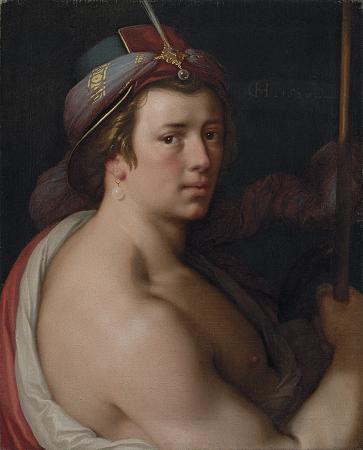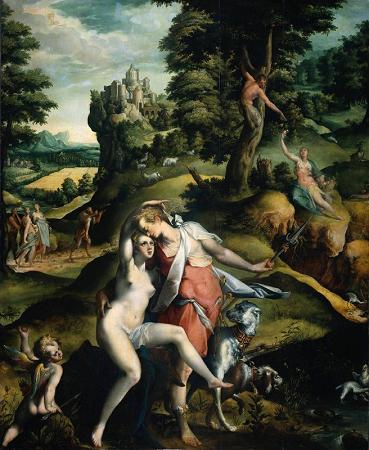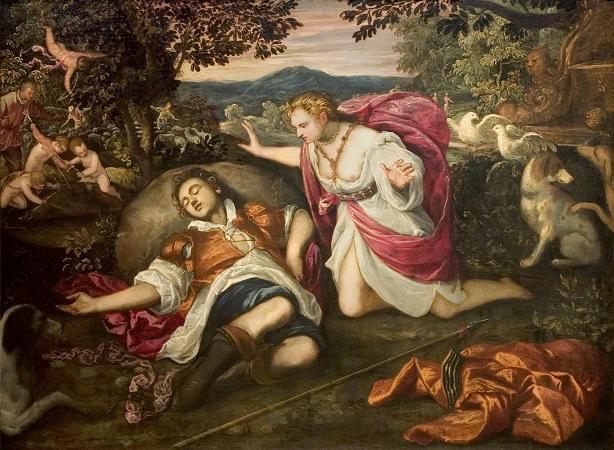Adonis. Adonis was the mortal lover of the goddess Aphrodite in Greek mythology. Adonis is typically depicted as a young, attractive man, reflecting his association with Aphrodite and the concept of ideal beauty. His physical appearance often emphasizes his athletic build, smooth skin, and graceful features. He is often shown in natural settings, surrounded by wildlife and lush vegetation. He is frequently depicted as a hunter, accompanied by hunting dogs or holding a bow and arrow. This association with hunting and nature highlights his connection to the wild and untamed aspects of life. As Aphrodite's lover, Adonis is often depicted in scenes that convey love, desire, and passion. He may be shown embracing Aphrodite, or in scenes that allude to their romantic relationship. These depictions often emphasize the intense emotional connection between the two figures. The myth of Adonis involves his untimely death, usually caused by a hunting accident, and his subsequent rebirth or resurrection. Adonis' death is sometimes depicted as a tragic event, with Aphrodite mourning over his lifeless body. Alternatively, his rebirth may be represented through images of flowers or other symbols of renewal and growth, reflecting the cyclical nature of life and death. Adonis may also be depicted in various mythological scenes, such as his birth from the myrrh tree, his introduction to Aphrodite, or his encounters with other gods and goddesses. In Ovid's first-century AD telling of the myth, he was conceived after Aphrodite cursed his mother Myrrha to lust after her own father, King Cinyras of Cyprus. Myrrha had sex with her father in complete darkness for nine nights, but he discovered her identity and chased her with a sword. The gods transformed her into a myrrh tree and, in the form of a tree, she gave birth to Adonis. Aphrodite found the infant and gave him to be raised by Persephone, the queen of the Underworld. Adonis grew into an astonishingly handsome young man, causing Aphrodite and Persephone to feud over him, with Zeus eventually decreeing that Adonis would spend one third of the year in the Underworld with Persephone, one third of the year with Aphrodite, and the final third of the year with whomever he chose. Adonis chose to spend his final third of the year with Aphrodite. One day, Adonis was gored by a wild boar during a hunting trip and died in Aphrodite's arms as she wept. His blood mingled with her tears and became the anemone flower. Aphrodite declared the Adonia festival commemorating his tragic death, which was celebrated by women every year in midsummer. During this festival, Greek women would plant gardens of Adonis, small pots containing fast-growing plants, which they would set on top of their houses in the hot sun. The plants would sprout, but soon wither and die. Then the women would mourn the death of Adonis, tearing their clothes and beating their breasts in a public display of grief. The Greeks considered Adonis's cult to be of Oriental origin. Adonis's name comes from a Canaanite word meaning lord and modern scholars consider the story of Aphrodite and Adonis to be derived from the earlier Mesopotamian myth of Inanna and Dumuzid. In late nineteenth and early twentieth century scholarship of religion, Adonis was widely seen as a prime example of the archetypal dying-and-rising god, but the existence of the dying-and-rising god archetype has been largely rejected by modern scholars and its application to Adonis is undermined by the fact that no pre-Christian text ever describes Adonis as rising from the dead and the only possible references to his resurrection are late, ambiguous allusions made by Christian writers.
more...













